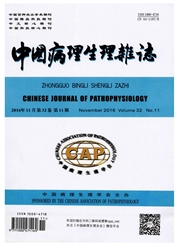

 中文摘要:
中文摘要:
目的:研究大蒜素对体外培养的大鼠NK细胞肿瘤杀伤活性的影响,并初步分析其可能机制.方法:免疫磁珠分选法分离大鼠脾脏NK细胞,流式细胞仪检测不同浓度的大蒜素对NK细胞的增殖和凋亡的影响,ELISA检测大鼠脾脏NK细胞IFN-γ的分泌水平,乳酸脱氢酶(LDH)法检测大鼠脾脏NK细胞对小鼠淋巴瘤Yac-1细胞的杀伤活性.结果:大蒜素对体外培养的NK细胞有明显的促进增殖和抑制NK细胞自然凋亡的作用,并能提高NK细胞分泌IFN-γ的水平和增强对Yac-1细胞的杀伤毒性,且在一定的浓度范围内呈剂量依赖性,其中30 mg/L是大蒜素的相对适宜浓度.结论:大蒜素可能通过上调NK细胞分泌IFN-γ的水平,增强其体外肿瘤杀伤能力.
 英文摘要:
英文摘要:
AIM: To investigate the role of allicin on the anti - tumor activity of rat NK cells in vitro. METH- ODS : CD3 - NKR - PI^+ NK cells were isolated from rat spleen using Dynabeads FlowCompTM Flexi system. The proliferation and apoptosis of the NK cells induced by allicin were analyzed by the method of flow cytometry. The levels of IFN - γ in the supematants were measured by ELISA. Lactate dehydrogenase release assay was used to detect the cytotoxicity of the NK cells. RESULTS: In vitro, allicin significantly promoted the proliferation of NK cells, inhibited NK call apoptosis, increased the level of IFN - FT in supernatants and enhanced the cytotoxicity of the NK cells to Yac - 1 tumor cells in a dose - dependent manner. Allicin at concentration of 30 mg/L exerted the maximal effect on activating NK cells. CONCLU- SION: Allicin enhances the activity of NK cells in vitro by upregulating IFN - γ expression.
 同期刊论文项目
同期刊论文项目
 同项目期刊论文
同项目期刊论文
 期刊信息
期刊信息
